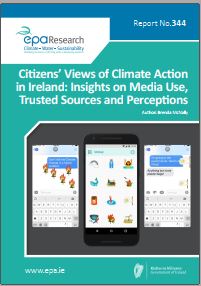Research 344: Citizens’ Views of Climate Action in Ireland: Insights on Media Use, Trusted Sources and Perceptions
Author: Brenda McNally
Summary: As the physical impacts of climate change become more urgent and the subject of wider public concern, greater understanding of the societal responses will be needed. This project investigated citizens’ views of and media consumption about climate actions in Ireland. The report supports environmental policymaking by providing data to tailor communication about climate action and to broaden citizen engagement with climate change.

Project Highlights
Watch the project highlights video
While there is consensus about the need to communicate with citizens about climate change and to increase public engagement with climate action, this requires greater understanding of citizens’ communication needs and media preferences. Therefore, research as to what citizens currently know about tackling climate change and their information seeking about this challenge is urgently required. This project addresses that gap by investigating citizens’ views of and media consumption about climate actions in Ireland. In doing so, the report supports environmental policymaking by providing data to tailor communication about climate action and to broaden citizen engagement with climate change.
Identifying Pressures
Public engagement is widely accepted as both an urgent and a necessary communications strategy for mobilising citizen concern about, support for and involvement with climate action. However, there are several conceptualisations and processes for enacting public engagement, ranging from persuasive techniques to harness behavioural change, to citizen-led grassroots initiatives and forms of participation in policymaking, such as the Citizens’ Assembly. Significantly, they all involve public dialogue (i.e. talking and listening). Thus, greater knowledge of what citizens in Ireland currently say about tackling climate change and insights on their views about climate action represent an important starting point for advancing public dialogue about climate change. Furthermore, given that most people gain information about climate change actions via a proliferating range of media channels and platforms, it is also important to understand citizens’ media choices, information-seeking and trusted sources on climate actions. Therefore, this study sheds light on the contemporary communicative context in which citizens engage with climate action and highlights the opportunities for and barriers to progressive dialogue and broadening citizen engagement in Ireland posed by this new communication landscape.
Informing Policy
The study undertook focus group discussions at which participants completed a survey of their media consumption around climate action in Ireland. The group discussions identified public views about different levels of climate actions and the survey responses highlighted citizens’ preferred media and trusted sources on climate change. By analysing citizens’ current understandings of, everyday responses to and expectations of climate actions, as well as their media choices, the findings shed light on what additional or new communications messages may be needed to increase awareness of, support for and involvement with the societal responses to climate change. The study seeks to inform policy about potential gaps and opportunities for innovating communication about climate actions and to provide new starting points for citizen dialogues such as the National Dialogue on Climate Change.
Developing Solutions
The survey findings showed that participants were very concerned about conflicts of interest on climate action and that scientists were viewed as reliable sources because they were perceived as objective conveyors of facts. These findings draw attention to the role of trust and transparency when engaging citizens with climate action and the need to build trust in communications initiatives. The focus group discussions revealed a unique Irish inflection to citizens’ engagement with climate change; participant discussions were dominated by negative sentiments relating to doubts about meaningful government and business responses to climate change. Consistent with recent consumer surveys in Ireland, there was a focus on individual consumer engagement but a notable lack of awareness about different levels of mitigation processes and the idea of “A Just Transition”. This indicates the need for social learning about carbon-reduction activities and for communications initiatives promoting collective and community engagement, as well as more discussion of the social, ethical and technological dimensions of climate action in Ireland.
https://www.epa.ie/media/epa-2020/publications/research/Thumbnail_344.jpg